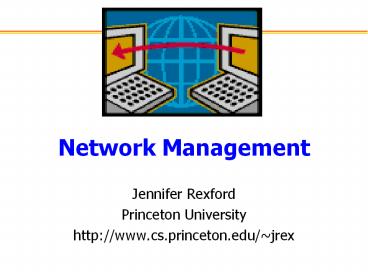Network Management - PowerPoint PPT Presentation
Title:
Network Management
Description:
Network Management Jennifer Rexford Princeton University http://www.cs.princeton.edu/~jrex – PowerPoint PPT presentation
Number of Views:71
Avg rating:3.0/5.0
Title: Network Management
1
Network Management
- Jennifer Rexford
- Princeton University
- http//www.cs.princeton.edu/jrex
2
My Research Interests Network Management
- The boundary between network elements and the
systems that manage them - Internet not built with management in mind
- Leading to expensive, convoluted solutions
- Clean-slate approach design for managability
- New architectures that are easier to manage
- Routing, packet forwarding, traffic management
- Ways my research would use GENI
- Running my own backbone, with my own routers
3
Today Inside a Single Network
- Data Plane
- Packet handling by routers
- Forwarding, filtering, queuing
Packet filters
4
Example 1 Network-Wide Control
- Getting rid of most of the control plane
- Real-time, network-wide management service
- Control plane merely provides measurement data
- Routing Control Platform (RCP)
- Has routing adjacencies with neighboring ISPs
- and directly configures the forwarding tables
- Based on network-wide policy objectives
RCP
RCP
BGP with ISPs
BGP with ISPs
5
Example 2 Secure, Robust Interdomain Routing
- Todays interdomain routing
- Single-path routing with convoluted decision
rules - No connection with behavior of the data plane
- Leading to vulnerabilities and poor performance
- Changing the routing protocol
- Anomaly detection to avoid suspicious routes
- Propagating multiple paths to customer
- Changing the data plane
- End-to-end monitoring of integrity performance
- Direct influence over the path-selection process
6
Example 3 Distributed Adaptive Traffic
Engineering
- Todays division of labor
- Users TCP congestion control
- Routers link-state routing protocols
- Operators tuning link weights on coarse
timescale - Top-down design from optimization theory
- Multiple paths between pairs of nodes
- Direct feedback from links about congestion
- Dynamic changes to sending rate along each path
7
Example 4 New Data-Plane Functionality
- Direct control over packet forwarding
- Management service can write forwarding tables
- Flexible splitting of traffic over multiple paths
- Packet measurement support on links
- Traffic statistics, such as congestion price
- UFO Underlay Friendly to Overlays
- Tunnel tables that subscribed services can modify
- Explicit feedback about network conditions
- Graceful handling of planned changes
- Advanced notice to subscribed overlay services
- Network-wide commit of new data-plane state
8
GENI Programmable Packet Processor
General purpose processors
C P U
C P U
C P U
C P U
N P
Switch Fabric
High-speed packet forwarding
F P G A
L C
L C
L C
L C
Links to other backbone nodes, edge sites, and
legacy Internet
9
How Id Use the Programmable Packet Processor
- Line cards
- Links, perhaps with bandwidth guarantees
- General-purpose processors
- Control/management plane functionality
- Overlay services subscribed to my network
- Network processors and FPGAs
- First, conventional IP- and MAC-based forwarding
- Then, my nifty customized data-plane design
- Support for connecting to legacy Internet
- BGP sessions, address translation, tunneling
10
Attracting Real Users
- How would I attract real users
- to my nerdy new routing architecture???
- Real users
- Connect from a GENI edge site over via a tunnel
- Treat my experiment as their service provider
- Distributed services, take me to your users!
- New services running on GENI (e.g., new CDN)
- Could run over my backbone architecture
- for better performance, reliability, security,
flexibility, visibility, and many other X-ities
?
11
Conclusions
- Network management is hard
- Because the Internet wasnt designed for it
- Retrofitting management can only go so far
- Clean-slate design for manageability
- Revisiting the roles of operators, routers, users
- Novel management, control, and data planes
- Capitalizing on the GENI backbone
- Building an experimental service-provider network
- That runs my proposed refactoring of the roles































